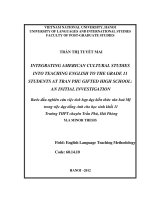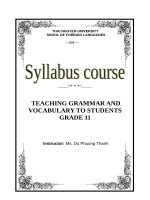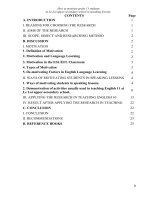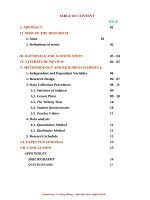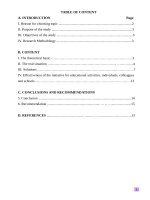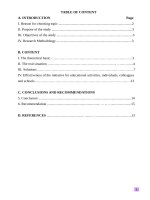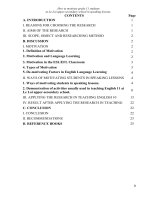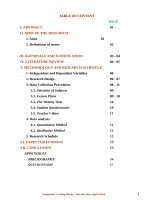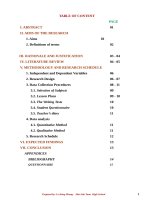teaching grammar and vocabulary to students grade 11
Bạn đang xem bản rút gọn của tài liệu. Xem và tải ngay bản đầy đủ của tài liệu tại đây (268.1 KB, 15 trang )
THAI NGUYEN UNIVERSITY
SHOOL OF FOREIGN LANGUAGES
--------
__________
TEACHING GRAMMAR AND
VOCABULARY TO STUDENTS
GRADE 11
Instructor: Ms. Do Phuong Thanh
I.Introduction
It is strongly agreed that grammar and vocabulary are very important angles
in learning English. If you grasp grammatical structures and have amount of
abundant words, you will communicate fluently as well as solve exercises easily.
Moreover, it’s so useful when grammar and vocabulary are combined together in 4
skills: speaking, reading, writing and listening. This affects directly to Students’
advance in practicing English. In English 11 curriculum, grammar focus on some
main parts such as: tenses, clauses, infinitive and so on; while vocabulary consists
of 16 different topics completed clearly follow national standard. We based on that
to make this syllabus to reinforce knowledge system and extend practicing
exercises ability of student. In addition, students will be provided necessary skills
to raise their vocabulary, for instance: remembering, developing a word,
pronunciation when they learn about a particular topic. Learning new words when
doing grammatical exercises is also an intelligent method to improve students’
vocabulary. The reasons above explained why we want to combine both grammar
and vocabulary in a curriculum for student grade 11. In process of constructing this
syllabus, we reproduced some materials from English 11, English Workbook 11,
English grammar … and other possible websites. We hope that all will bring better
results and benefit for students’ progression.
II. Goals and objectives
1. The goal of our course is that the student will be able to use English in
communication and common topics. The center’s aim is to help students learn
English grammar and vocabulary.
2. At the end of the course, students will be able to:
- Grasp the main point of basis grammar (tenses, indirect speech, passive voice…).
- Use grammar as background knowledge to support language skills at very basis
level. Over 80% of students can use and apply correctly in communication.
- Use grammar knowledge to perform simple tasks such as sentence writing or
error analyzing.
- Understand how the word can be combined to create meanings and how these
effect can create effective texts.
Percive 80% of a reading passage contained approximately 600 words.
- Write correctly over 70% words and phrases in the course and apply in
communicating successful.
-Write a passage about 250 words with meaningful sentences with true
grammatical form.
III. Schedule
A course lasts for 15 weeks.
- 2 periods per week
- 1 hours per period
- 15 units per 15 weeks
- 3 tests: +2 mid-term tests at 7th and 13th weeks. (15 minutes tests)
+Final-test at 15th week. (45 minutes test)
IV.Timetable
WEEK
UNIT
1
1.
Theory
- Infinitive
+ Vocabulary: Vocabulary about physical
with to
characteristics.
- Infinitive
+ Grammar: V + to
V- infinitive
without to
CONTENT MATERIALS
[1] P. 5
[1] P.20
[1] P. 21
Practice
Task 1: Choose the correct form of the verbs in parentheses
[4] P. 199
in the following sentence.
Task 2: Rewire the sentence using the word given in
[1] P. 5
bracket.
Task 3: Fill in the gaps.
[5] P. 35
Task 4: Find out and correct the mistakes.
[6] P. 52
Homework
Exercise 1: Put the words in the correct order to
[1] P. 6
make sentence writing the main verb, in the present
simple and making the other an infinitive with to.
2. Present
Exercise 2: Choose the best answer .
[2] P. 4
Exercise 3: Correct the best answer (A, B, C, D ).
[6] P. 53
Theory
simple1. + Vocabulary: Vocabulary about personal experiences.
2. + Grammar: Present simple indicating past time .
Tense revision : past simple, past
progressive and past perfect.
Practice
Task 1: Use the correct present tense forms of verbs in
brackets in the story below. The first one has been
done for you as an example.
Task 2: Complete the sentences by putting the verbs
into the past simple or progressive.
Task 3: Give the right forms of the verbs in brackets:
past tenses.
Task 4: Choose the correct.
Homework
Exercise 1: Supply the correct verb forms : present tenses.
Exercise 2: Underline the most suitable tense form.
Exercise 3: Circle the correct answer ( A, B, C, D )
3. Infinitive
Theory
and gerund
+ Vocabulary: Vocabulary about a party.
+ Grammar: infinitive and gerund
[1] P. 30
[1] P. 30
[1] P. 31
[4] P. 19
[4] P. 19
[4] P. 20
[4] P. 21
[4] P. 17
[2] P. 6
[7] P. 120
[1] P. 32
[1] P. 39
Practice
Task 1: Supply the correct verbs forms.
Task 2: Choose the correct answer to complete the
[4] P. 115
[3] P. 85
sentences.
Task 3: Complete the sentences with the correct form,
[1] P. 40
gerund or infinitive, using the word in brackets.
Homework
Exercise 1: Choose the best answer to complete the
sentences.
Exercise 2: Fill in blank.
Exercise 3: Find out and correct the mistakes.
4. Gerund
Theory
and present
+ Vocabulary: Vocabulary about volunteer work.
+ Grammar: gerund and present participle ; perfect
participle
[1] P. 40
[2] P. 20
[7] P. 55
[1] P. 46
[1] P.64
gerund and perfect participle.
Practice
[1] P. 54
Task 1: Complete each of the following sentences with
an appropriate gerund of the verbs from the box .
Task 2: Put the verbs in bracket into the perfect
gerund or perfect participle.
Task 3: Choose the best answer.
[1] P.55
[4] P. 110
[2] P. 45
Homework
Exercise 1: Complete each of the following sentences with
[7] P. 63
an appropriate present participle of the verbs from
the box.
Exercise 2: Correct the correct answer (A, B, C, D )
Exercise 3: Fill in the blank.
[6] P. 35
5. Reported
● Theory
speech with
+ Vocabulary: Vocabulary about illiteracy.
+Grammar: Reported speech with inifitives(s)
inifitives(s)
[6] P. 60
[1] P. 64 -65
Practice
Task1: Complete the second sentence so that it
has milar meaning to the first one, using the
words give.
Task 2: Change direct sentence into indirect sentence.
[7] P. 14
● Homework
[7] P. 20
Exercise 1: Use a verb from the box to rewrite each
sentence in reported speech, beginning as shown.
Do not change the meaning.
Exercise 2: Rewrite each sentence in reported speech,
[8] P. 30
beginning as shown. Do not change the meaning.
[13] (exercise)
6. Reported
● Theory
speech with
+ Vocabulary: Vocabulary about competitions.
+Grammar: Reported speech with gerund.
[6] P. 62
[9] P. 50
● Practice
[3] P. 26
gerund
Task 1: Rewrite the dialogues in report speech, using
gerund.
Task 2: Change direct speech into reported speech.
Begin each of the sentences in the way shown.
● Homework
[1] P. 74-75
[2] P. 40
[2] P. 50
Exercise 1: Fill in the gaps.
Exercise 2: Choose the correct answer.
7. Conditional
● Theory
sentences
+ Vocabulary: Vocabulary about world population.
+ Grammar
- Conditional types 1 and 2.
- Conditional type 3.
- Conditional in reported speech.
[6] P. 64
[10] P. 35
● Practice
[4] P. 40
Task 1: Put the verbs in brackets into the correct
[5] P. 60
form.Add’ll/will or’d/ would if necessary.
Task 2: Put the verbs in brackets into the correct
form.
[1] P. 87-89
● Homework
[8] P. 32
Exercise 1: Underline the correct word or phrase in
each sentence.
Exercise 2: Choose the word or phrase among A, B,
C or D which best completes each sentence.
8. Identifinied
Pronouns
● Theory
[6] P. 66
+ Vocabulary: vocabulary about celebrations.
+ Grammar: Pronouns one(s), someone, anyone, [10] ( exercise)
no one, everyone.
● Practice
Task 1: Complete the sentences. Using someone,
anyone, using each word twice.
Task 2: Rewrite the sentences, using the pronoun
one(s).
● Homework
[4] P. 45
[1] P. 98-99
[8] P. 34
[4] P. 47
Exercise 1: Put one or ones in the following dialogues.
Exercise2: Choose the correct answer.
9. Relative
● Theory
clauses
+ Vocabulary: Vocabulary about post office.
+ Grammar: Relative clauses - non-defining
[1] P. 80
[1] P. 97
relative clauses.
● Practice
Task 1: Choose the correct answer.
Task 2: + Fill in the gaps.
+ Rewrite the sentences using the
relative clauses.
Task 3: Exerxise 2, 3, 4, 5 ( Chapter 9)
[7] P. 23-37
[4] P.72-79
[3] P.22
[8] P. 32
[4] P.75 - 86
● Homework
Exercise 5, 9, 12.
10. Relative
● Theory
pronouns
+ Vocabulary: Vocabulary about nature.
+ Grammar: Relative pronouns with preposition.
In formal or written English, the preposition is
often placed before the relative pronoun, and in this
case the pronoun cannot be omitted.
with
preposition
[1] P. 34- 45
[1] P. 68
● Practice
Task 1: Give the correct form of the given words.
Task 2: Choose the best answer.
Task 3: Find out and correct the mistakes.
[2] P. 87-89
● Homework
[6] P.65
Exercise 1, 9. Chapter 10 [10] ( exercise)
Exercise 5, 9, 12.
[7] P.45- 70
[3] P. 36- 50
11.Relative
● Theory
Clauses
+ Vocabulary: Vocabulary about source of energy.
+ Grammar: Relative clauses replaced by participle
and to infinitive.
replaced by
participle
and to
infinitive
[1] P.124
[1] P. 147
● Practice
Task 1: Choose the correct answer.
Task 2: Rewrite the sentences using the relative
clauses replaced by participle and to infinitive.
[3] P. 91- 93
[1] P. 150
● Homework
Exercise 1: Rewrite the sentences using participles or
to infinitive.
Exercise 2: Correct the mistake of each sentence.
[4] P. 78
[7] P. 56
12. Omission
● Theory
of relative
+ Vocabulary: Vocabulary about the Asian Game.
+ Grammar: Relative clause revision Omission of
relative pronouns using present participles, past
participles, to infinitive, noun phrases.
[1] P.136
[1] P. 153
● Practice
[9] P. 98
[3] P. 67
pronouns
Task 1: Choose the correct answer.
Task 2: Rewrite the sentences by omission relative
clauses.
● Homework
[17] ( test)
[6] P. 34
Exercise 1: Give the correct form of given words.
Exercise 2: Choose the best answer.
13. Cleft
● Theory
sentences
+ Vocabulary: Vocabulary about hobbies.
+ Grammar: Cleft sentences:
It + be + phrase + defining relative clause
1. Subject focus
2. Object focus
3. Adverbial focus
[1] P.147
[1] P.152- 153
● Practice
[4] P. 178
[1] P.154-155
[11] ( test)
Task1: Complete sentences.
Task 2: Complete sentences.
Task 3: Complete sentences. [14] ( exercise)
● Homework
Write the sentences after the model.
14.
● Theory
Conjunctions
+ Vocabulary: Vocabulary about recreation.
+ Grammar:
1.Conjunctions:
Both…and, not only…but also, either…or, neither…
nor
2. Cleft sentences in passive.
It + is / was + Noun / pronoun + who/ that + be +
V3/-ed…
● Practice
[1] P. 155
[1] P. 161
[4] P. 79
Task 1: Combine the sentences.
Task 2: Change the sentences.
● Homework
Exercise 1: Rewrite the sentences using the paired
conjunctions given in brackets.
Exercise 2: Write the sentences after the model.
[1] P. 161-162
[13] ( exercise)
[12] (exercise)
[15] (exercise)
15. Space
● Theory
conquest
+ Vocabulary: Vocabulary about space conquest.
+ Grammar
1. Could/ be able to
2. Tag question:
To confirm that something is true or not, or to
encourage a reply from the person we are speaking to.
[1] P. 167
[6] P. 85
● Practice [16] ( grammar)
Task 1: Complete the sentences.
Task 2: Write sentences with tag questions.
● Homework
Exercise 1: Complete the sentences with
[1] P.176 - 177
[17] ( exercise)
[4] P. 124
could, was/were able to or couldn't.
Exercise 2: Put in the correct question tags.
16. Passive
+ Vocabulary: The wonder od the world
voice.
+ Grammar: Passive voice of indirect speech with :
[1] P. 173
- It’s said that…
- People say that…
● Theory
[3] P. 137
● Practice
Task 1: Rewrite each sentence in 2 ways.
[2] P. 97
Task 2: Change each indirect speech into correct
[10] ( Indirect
passive voice.
speech )
● Homework
Exercise 1: Chose the corerect sentence
[4] P. 121
Exercise 2: Rewrite each sentence in 2 ways.
[3] P. 144
Exercise 3: Underline the word which is different meaging.
[3] P. 118
V. Testing and assessment
- The results of the course will be divided into 2 part process and final test.
Each part accounts for 50%.
- Process includes oral test, quizzes and mid-term test.
+ Oral test: 10%
+ Quizzes: 10%
+ Mid-term test: 30%
Oral test: An oral test will be assigned almost every class period. Each oral test
will be graded. If student can dowel, they will get 10 marks. Teacher will not give
mark for students unless there are many mistakes. The form of an oral test
essentially is 2 types. The first type is to check student understands. Teacher will
ask students to give the use, form or meaning of a grammatical point which they
studied in the previous lesson. The 2nd type is to do exercises. Students will be
asked for doing an exercise in this book. Oral test will be given to students at the
beginning of class period.
Quizzes: there will be many quizzes. It may be one quiz in every class period.
Quizzes will relate to the current or pervious topics. Teacher can ask students to do
a quiz at any time. A quiz can be given at the beginning or end of the class.. It is 510 minutes for each with 5-10 questions. It organizes with many forms such as
games, activities, mini test…There will be no preparation quizzes. If any student
absents, they will get zero for that quiz and no extra quiz.
Mid-term test: There are 2 mid-term tests. Students will be asked to do the midterm test at week 7th and week 13th. It is 15 minutes for each test with 10- 15
questions which concludes some types: multiple choices, gap filling, rewrite
sentences, give correct verbs form. The content of these tests will base on the
knowledge which student has studied. Each mid-term test will account for 15 % of
the total 30%.
Final exam: The final exam will be comprehensive and entirely knowledge which
students have studied in this course. It will be given at the end of the schedule
(15th week). It is a 45 minutes test with 40 questions which concludes 4 types of
exercises: multiple choices, gap filling, matching and review the sentences. There
is only one final test and it accounts for 50% of the total 10.
Sample
Exercise 1. (2 points ) Choose a,b,c,d that best completes each unfinished
sentence , or has a close meaning to the original one.
a. acquaint
1. She found it difficult to get ……….with new friends
b. acquainted
c. acquaintance
d. acquaints
2. Daisy is so ……………. She only cares about herself , not about other
people .
a. helpful
b. selfish
c. loyal
d. talkative
3. Look ! Mary is ………….a beautiful new dress. She looks so pretty in the
dress
a. wearing
b. carrying
c. putting on
d. bringing
4. China is the most ………..country in the world
a. popular
b. populous
c. populate
d. populated
5. To most Vietnamese people , Tet holiday is often well……..
a. prepare
b. prepared
c. preparation
d. preparative
Exercise 2 ( 2 points) Find out and correct the mistakes
.
1/ A friend can help you solve problem and to share the gried times along
with
A
B
C
the grate times .
D
2/ Two close friends can spend time to be together without needing to pretend
A
B
C
D
3/ Volunteers can teach primary subjects, having organized sport and art
A
B
C
activities for the children .
D
4/ The world’s population was higher in the 1980s more than in the 1960s.
A
B
C
D
5/ Overpopulation is a short way to lead to poor, illiteracy, and social evils.
A
B
C
D
Exercise 3 Choose the best answer ( 2 points)
1. I -------------- this film twice.
A. see
B. saw
C. will see
D. have seen
2. After -------------- her performance, she invited the audience to ask
questions.
A. she finishes
B. finished
C. finishing
D. she will finish
3. His father -------------- of cancer last year.
A. will did
B. has died
C. died
D. had died
4. The train -------------- when we got to the station.
A. just left
B. just leaves
C. has just left
D. had just left
5. Many young people are fond of -------------- football and other kinds of
sports.
A. play
B. to play
C. playing
D. played
6. They couldn’t help -------------- when they heard the little boy singing a
love song.
A. laughing
B. to laugh
C. laugh
D. laughed
7. Your house needs -------------- .
A. redecorated
B. redecorating
C. being redecorated
D. to redecorate
8. I remember -------------- them to play in my garden.
A. to allow
B. allow
C. allowing
D. allowed
9. It was a nasty memory. Do you remember both of us wearing sunglasses to
avoid -------------- by the supervisors?
A. to recognize
B. to be recognized
C. recognizing
D. being recognized
10. I suggest -------------- some more mathematical puzzles.
A. do
B. to do
C. doing
D. Done
Exercise 4. (2 points) Fill in each numbered blank with one suitable word or
phrase.
(1)……………..the Vietnamese believe that the first visitor a family receives
in the year determines their fortune for the (2)…………year, people never
enter (3) ………….house on the first day without (4)………….. first. The act
of being the first person to enter a house on Tet ii called xong dat or dap
dat .Usually, a person with a happy demeanor or who had experienced good
luck during the previous year is visited first into the house. In some (5)
………………any person with names such as Phuc (happy), Tai ( wealth ),
Loc (luck), will be invited to (6)………….this act of xong dat. However, just
to be (7) ………….., The owner of the house will leave the house a few
minutes before midnight and come back just as the clock (8)
…………….midnight to prevent anyone else (9)…………….entering the
house first who might potentially bring any unfortunate events in the new
year to the household.
Sweeping during Tet is taboo, since it symbolizes sweeping the luck
away. It is also taboo for (10)……….. who experienced a recent loss of a
family member to visit anyone else during Tet.
1. a. although
b. Instead
c. due to
d. Since
2. a. all
b. whole
c. round
d. one
3. a. any
b. each
c. every
d. one
4. a. to be invited
b. to invited
c. being invited
d. inviting
5. a. cases
b. examples
c. kinds
d. sorts
6. a. take
b. perform
c. do
d. make
7. a. safe
b. safety
c. safetiness
d. safely
8. a. hits
b. knocks
c. strikes
d. shows
9. a. in
b. for
c. with
d. from
10. a. the one
b. anyone
c. no one
d. each one
Exercise 5 ( 2 points ) For each of sentences below, write a new sentence as
similar as possible in meaning to the orginal sentence.
1/ He warned them against using the mountain road.
=> I wouldn’t……………………………………………………………….
2/ I was made to study hard when I was at school.
=> They…………………………………………………………………….
3/ He told me my request was unreasonable.
=> He said, “ you can hardly……………………………
4/ It is a shame he had to leave before the end of the show.
=> I Wish…………………………………………………………………...
5/ I was made to study hard when I was at school .
References
* Books
1. Hoang Van Van, Hoang Thi Xuan Hoa, Dao Ngoc Loc, Vu Thi Loi. English
course book 11.The Ministry of Education. 2007.
2. Mai Lan Huong, Nguyen Thanh Loan. English workbook 11. The Ministry
of Education, 2007.
3. Tran Van On. English notebook 1. The Ministry of Education. 2007.
4. Bogdan, S.K. English Grammar. Ha Noi National University. 2005.
5. Raymond Murphy. English basic grammar. Hai phong. 2010.
6. Nguyen Huu Luan. English vocabulary 11. Ha Noi National University.
2008.
7. Tran Thao Nguyen. English practise 11. Youth Publishing House. 2009.
8. Le Hung Manh. English handbook 11. Hai Phong 2002.
9. Brown & M.A. A practical English grammar. Youth Publishing House. 2005.
* Websites:
10. www.tienganh123.com
11. www.English-hilfen.de
12.
13.
14.
15.
16.
17.
